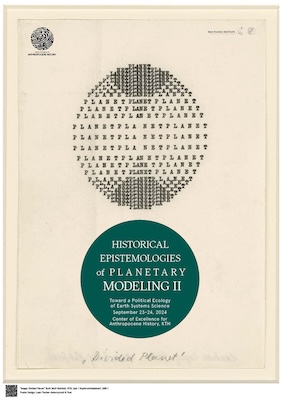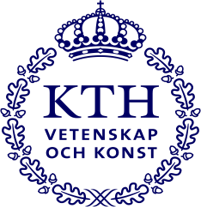Historical Epistemologies of Planetary Modelling (HEPM)

Historical Epistemologies of Planetary Modelling (HEPM) is an ongoing project between KTH Centre of Excellence for Anthropocene History in Stockholm and the Max Planck Institute for the History of Science Berlin that works to collate and advance recent histories of Earth Systems Science (ESS), the computational and model-based analysis of the planet as a parametrized system of feedbacks.
Project Leaders
Centre of Excellence for Anthropocene History Co-Director Adam Wickberg and Thomas Turnbull , Researcher at Max Planck Institute for the History of Science (MPIWG).
Upcoming Events
23-24th June, 2025, Project Workshop 3, Venice Historical Epistemologies of Planetary Modeling III (HEPM III) Toward a Radical Earth System Science (pdf 1.8 MB)
"Responding to the growing authority of Earth System Science (ESS), the HEPM
workshops have historicized and interrogated the methods, media, and knowledge
with which scientists of planetary simulation and modeling work. Historicization has
been used to bring this dominant science back down to Earth and to question the
authority that its proponents claim. Our critical analysis of the political economy of
ESS revealed an increasingly philanthropic and corporation-aligned science, one
which people in general feel increasingly alienated and unmotivated by. However,
there are signs of a more grassroots and radical form of planet-scale science emerging.
In this third workshop, the insights of historicization and political ecology critique are
directed toward the identification and formulation of a radical new kind of ESS.
Speakers will present progressive visions of ESS, complimented by the critical work
of hackers, historians, and radical theorists of Earth-scale thinking."
Location: The New Institute - Centre for Environmental Humanities (NICHE) at Ca’Foscari Venice University
Past Events
September 2024, Project Workshop 2, Stockholm
"While recognizing the need for a more detailed understanding of our environment’s many dynamics and with ever-greater empiricism, HEPMII is oriented toward the political ecology of ESS. Advancing a critical ecological epistemology of ESS, this workshop is concerned with ESS’s relation to state power, surveillance technologies, and political relations. It will explore the material and energetic demands of ESS and its technologies. We will also ask, in a constructive register, what would a more radical kind of planetary modeling look like? And, as part of this work, how can underrepresented, marginalized, and oppressed perspectives be integrated?"
June 2024, Guest Presentation, Venice
Planetary Modelling: From Historical Epistemologies to Political Ecologies
"It is often claimed that ESS provides essential knowledge that can inform environmental policy and behavior change, but as yet, the relationship between evidence and action has been unanalyzed. Society’s lack of progress in responding to the environmental crisis over the past decades happened while ESS has become the dominant discipline informing these responses. ESS has a distinct politics, which more often seeks to sustain rather than transform extant ways of life, as the socioeconomic goals embedded within integrated assessment models demonstrate. Science largely emerges from the world’s wealthiest nations and can be a means to maintain their geopolitical supremacy. Seeking to advance a critical ecological epistemology of ESS, HEPM is concerned with ESS’s relation to state power, surveillance technologies, and political relations."
June 2023. Project Workshop 1, Berlin
Historical Epistemologies of Planetary Modelling (HEPM I)
"This event brings together historians of science, technology, and the environment for a discussion-oriented workshop focusing on the historical epistemology of planetary modelling. The aim is to interrogate how data and modelling came to dominate the understanding of the planetary crisis as well as to think critically about how power relations affect knowledge production about global environmental change. The workshop will explore the integrative potentials as well as the epistemic frictions between Earth system science and historical and archaeological complexity of the Anthropocene. At present, in spite of ever-increasing amounts of environmental data and improved modelling capabilities, agreed targets like the 1.5 C degree goal are declared dead halfway through the path to Agenda 2030. Why do ever-more detailed simulations and rich data not lead to better policy and a stronger societal response to modelled testimonies? How can historical understanding better inform the epistemology of Earth system science? And how can knowledge from Earth system science be better integrated into Anthropocene history?"

